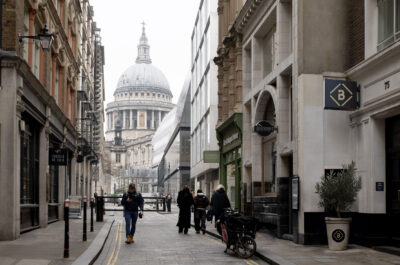Through April 2016, London’s RevPAR dropped 3.2% to GBP95.60. Although average daily rate declined moderately (-0.5% to GBP128.34) during that period, occupancy dropped 2.7% to 74.5%. Overall, London has reported year-over-year occupancy declines for each month since November 2015.
LONDON – The hotel industry in London, England, is projected to experience continued performance declines through 2016, but positive results in 2017, according to a quarterly forecast report from STR and Tourism Economics.
London has posted year-over-year growth in revenue per available room (RevPAR) for six consecutive years beginning with 2010. Through April 2016, London’s RevPAR dropped 3.2% to GBP95.60. Although average daily rate declined moderately (-0.5% to GBP128.34) during that period, occupancy dropped 2.7% to 74.5%. Overall, London has reported year-over-year occupancy declines for each month since November 2015.
STR and Tourism Economics’ market forecast reports, which are updated quarterly for more than 60 markets worldwide, are based on historic hotel data records as well as several economic factors.
Looking at the remaining months of 2016, several factors will likely have a negative impact on hotel performance in London:
- In 2015, London hosted several major events that will not repeat in 2016, including the Rugby World Cup, the Ashes (cricket series) and the biennial Defence & Security Equipment International (DSEI)
- New supply continues to enter the market (+2.5% year to date), resulting in negative occupancy performance and suppressing growth potential in ADR.
- The results of the upcoming referendum on Brexit could have a negative impact on industry performance. The forecast currently assumes that the decision will be for the U.K. to ‘remain’ in the EU, but a ‘leave’ result could potentially be detrimental to London’s hotel market.
- Ongoing security threats in Europe are likely affecting the number of long-haul international arrivals, according to Tourism Economics, although short-haul demand remains strong.
Better performance in 2017
STR and Tourism Economics expect performance recovery in 2017 to be driven by domestic demand, indicated by gross-domestic-product growth, as well as an increase in the consumer price index and renewed investments activity.
Class performance in 2016
Analysis shows that London’s different classes will experience varying degrees of growth. The Luxury sector will likely be most affected by increases in supply, while demand remains slow from key feeder markets such as the Middle East, China and South America. In terms of ADR, 2015 marked the strongest rate increase for London’s Luxury class since 2012. As the current global economic situation remains uncertain, marginal ADR growth is projected through the end of 2016.
Supply growth also is expected to outpace demand over the remainder of 2016 in the Midscale and Economy segment. Despite this imbalance, demand in this segment is still expected to be higher than the total London average. According to analysts, many price-conscious travelers will likely continue choosing accommodations in these classes as the exchange rate between other currencies (such as the Euro) remains low against the British Pound.
STR and Tourism Economics revise market forecasts on a quarterly basis to reflect any shifts in the macro-economic environment, accounting for factors such as changes in traveller demographics, new pipeline information and other elements that impact hotel performance.
Theodore is the Co-Founder and Managing Editor of TravelDailyNews Media Network; his responsibilities include business development and planning for TravelDailyNews long-term opportunities.










































































































































































































